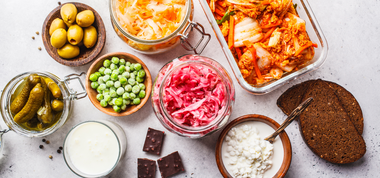Why Weight Watchers points are becoming irrelevant

As the new year approaches, many of us are getting ready with our resolutions. Top of the list for most Americans? “Lose weight and eat better”.
Which is maybe why Weight Watchers came out with an update to its SmartPoints system.
The problem? This latest incarnation may paradoxically undermine the value of having a Points system in the first place.
As a cardiologist, what I've learned is that diets don't work - because they focus on the wrong thing and are often unnecessarily complex. This is one of the reasons why I developed Step One Foods. And Weight Watchers helps prove my point.
Weight Watchers has been around since the 1960’s. It was founded by Jean Nidetch, a homemaker in Queens, who thought that people trying to lose weight would be more successful if their calorie restriction was coupled with group meetings of fellow dieters as a form of personal support. Along the way, the program adopted a “points” system to help make it easier to track calories (35 Points per day was about 1900 calories; and Point limits were assigned to individuals depending upon their age, gender, height, and weight).
In 2010, the "points" system changed from primarily tracking calories, to the PointsPlus system which also incorporated a consideration of the composition of those calories (fat, protein, fiber, and carbohydrates).
This was a significant shift. Think about it. Prior to 2010, a large apple and two small cookies were assigned similar points. Rational from a weight loss perspective, but not so much from an overall health perspective.
With PointsPlus, the apple became a 0. And a slice of sausage pizza went from 4 to 8.
In 2015, the company updated its rankings again. This time to SmartPoints, aiming to encourage even more fruit and vegetable intake and reduce consumption of added sugars and unhealthy fats. Now all fresh, frozen, and canned (without syrup) fruits were assigned a 0 score, as were all non-starchy vegetables (like leafy greens, carrots, tomatoes, green beans, asparagus, onions, broccoli and radishes). Dried, sweetened, or canned in syrup fruit still had points assigned, as did starchy vegetables like potatoes, corn, peas and winter squash.
This month, Weight Watchers introduced its Freestyle Program, which goes even further by markedly expanding the list of 0 Point foods. Nearly all fruits and vegetables are now on the list – including beans, peas and corn. Whole eggs, non-fat plain yogurt and nearly 50 different kinds of fish have also been added. So have 11 kinds of shellfish, including crab and lobster, as well as skinless chicken and turkey. Still not worthy? Steel cut oats, sweet potatoes and avocados.
A giant misstep for the company.
And not just because they left off oats and sweet potatoes! (though, honestly, what were they thinking??)
First the obvious – by setting 0 Points on foods like eggs and chicken, Weight Watchers is inviting disaster. Want to eat a whole roast chicken (without the skin)? Go ahead. 0 Points! A 3 egg omelet with smoked salmon? Good to go! Plus, now you have a bunch of Points left over for that sleeve of Oreos!
This shift actually makes the whole concept of Points progressively irrelevant. As it should be - because eating for weight loss is not as complicated as it's being made out to be.
As I’ve outlined in a previous blog, the best dietary advice I’ve ever seen can be summarized in just a few words:
Eat real food. Not too much. Mostly plants.
And isn’t that the “point” of the 0 Point system expansion? Though, paradoxically, the Points approach is more confusing because there is no distinction made between a whole roast chicken and a spear of broccoli. And (in odd opposition to mountains of research) whole grains are still relatively evil.
However, if you follow the best dietary advice ever, you already know that roast chicken is OK, but you should have WAY MORE of the broccoli (and of the beans and sweet potatoes) than of the chicken and that you shouldn’t stuff yourself. And that a bowl of unsweetened oatmeal for breakfast is a fabulous and healthy choice. No checking of points required.
Which brings me to my "point' - why do we need "points" at all? To let us know that Oreos are bad? Or to encourage us to eat eggs instead of oatmeal??
In an attempt to make itself more approachable – and perhaps allow Oprah to eat some more of her “favorite things” without guilt – Weight Watchers has made "points", well...pointless.
At Step One Foods we help you follow the best dietary advice ever by taking all the points and guesswork out of two servings of food per day. And in the process we help you not only lose weight but also help lower your cholesterol, improve your blood pressure, keep your blood sugar levels steadier, and support cognitive health.
And nothing underscores the power of a small change like eating just two servings of Step One Foods per day (instead of typical alternatives):
- 20, 30, even close to 40% cholesterol reductions in as little as a month
- a reduction of approximately 180 calorie per day, which translates into an 18 lb weight loss in a year
- 500 mg less sodium, which translates into over 1 and 1/2 cups of salt in a year - certainly a good thing for your blood pressure, and
- an increase of 10 grams of whole food fiber per day, which has been shown to reduce the risk of of heart attack by 14% and risk of dying from heart disease by 27%
Here's the real "point': when you purposefully eat for health, you actually get better health. Weight loss is just a natural side benefit.
Photo source: Weight Watchers

Tested & Proven Results.
- Cardiologist formulated
- Supported by over 500 publications
- Clinically-proven, in a double-blind randomized trial with Mayo Clinic and The University of Manitoba
80% of participants lowered their cholesterol in just 30 days. With just two servings per day, Step One Foods offers a proven-effective way to naturally lower LDL (bad) cholesterol.
Get heart health tips and articles like this, delivered right to your email.
New articles every week.
You may also like...

You don’t need to avoid foods with cholesterol…except for these





